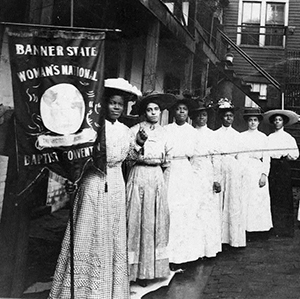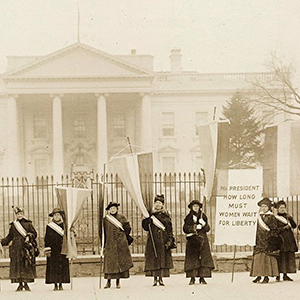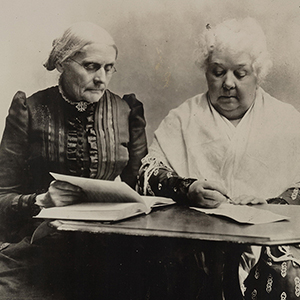100 YEARS OF WOMEN’S SUFFRAGE: Celebrating a Centennial and Reckoning with the Past
 Democratic women of the House wear white at the 2019 State of the Union
Democratic women of the House wear white at the 2019 State of the Union In 2019, Democratic women from the US House of Representatives invoked the suffragists of a century before by wearing white to the State of the Union. It was a powerful symbol of solidarity and a celebration of historic gains in the number of women sent to Washington, DC, to govern. In a tweet explaining why she wore a white suit and carried a kente cloth purse that night, freshman Congresswoman Ayanna Pressley (D-MA) said, “I honor women like #AlicePaul who led the movement & women like #IdaB who were excluded from it.”
As we reckon with so many aspects of white supremacy and the erasure from history of people of color, discussions of what today means and how it should be celebrated have raised many questions. Can this really be called the hundredth anniversary of all women in America winning the right to vote? Who do we highlight? Who do we ignore? More and more we’re learning of the struggles and victories of Black suffragists and other female fighters of color. We’re learning of the racist thinking that informed white suffragists’ actions and betrayals.
In her excellent three-part meditation on the centennial of the Nineteenth Amendment, national and international feminist leader and author Robin Morgan urges us to, yes, call it a great day, the celebration of “a watershed for women and democracy,” but to acknowledge straight up that August 18, 1920, was not a victory for all women. Morgan, who was named the American Humanist Association’s Humanist Heroine in 2007, points to the histories of suffragists of color, the misogyny they and their white counterparts faced, and argues for all the women who were part of the suffrage movement to be recognized. Which is what we are attempting in our coverage—to recognize the sung and the still unsung in hopes that the story grows and becomes more inclusive and more honest.
Jennifer Bardi
Editor in Chief, Humanist Magazine
Deputy Director, American Humanist Association
|
|
|
 |
A Centennial to Reckon With: Honoring Black SuffragistsBy Anya Steinberg |
|
|
|
 |
The Call of Disobedience: Lessons for Social Change from Our Feminist ForemothersBy Jeffrey Nall |
|
|
|
 |
Secular Suffragists: Elizabeth Cady Stanton, Matilda Joslyn Gage, and Susan B. AnthonyBy TheHumanist.com Staff |
|
|
|
